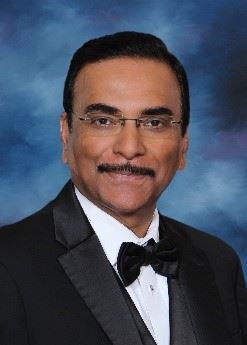AINA Announces 2018 Lifetime Achievement Winner
 Dr. Chaudhry is Professor of Neurology at the Johns Hopkins University School of Medicine where he is the co-director of EMG laboratory and was Vice‐Chair of Clinical Affairs and Director of the Neurology Outpatient Center. He is internationally recognized as a clinician, teacher, researcher, and a leader in field of neuromuscular medicine and electrophysiology. Dr. Chaudhry’s areas of research include Wallerian degeneration in human nerves, multifocal motor neuropathy, toxic neuropathies, and electrophysiological aspects of neuromuscular diseases. Dr. Chaudhry has over 130 publications and has participated in numerous clinical trials in motor neuron disease, peripheral neuropathies, myasthenia gravis, and myotonic muscular dystrophy. He has been on the editorial board of Muscle Nerve, Neurologist, and Science AAN.com. He has served on the board of directors of AAN and American Board of Electrodiagnostic Medicine. Dr. Chaudhry was the chair of Neuromuscular section of AAN (2001-05) and it was under his leadership that Neuromuscular Medicine Board was created. Dr. Chaudhry was President of the AINA from 2001-2003 and President of Aiimsonians of America (2002-4), his alumni group, which also awarded him with a distinguished alumnus award in 2006.
Dr. Chaudhry is Professor of Neurology at the Johns Hopkins University School of Medicine where he is the co-director of EMG laboratory and was Vice‐Chair of Clinical Affairs and Director of the Neurology Outpatient Center. He is internationally recognized as a clinician, teacher, researcher, and a leader in field of neuromuscular medicine and electrophysiology. Dr. Chaudhry’s areas of research include Wallerian degeneration in human nerves, multifocal motor neuropathy, toxic neuropathies, and electrophysiological aspects of neuromuscular diseases. Dr. Chaudhry has over 130 publications and has participated in numerous clinical trials in motor neuron disease, peripheral neuropathies, myasthenia gravis, and myotonic muscular dystrophy. He has been on the editorial board of Muscle Nerve, Neurologist, and Science AAN.com. He has served on the board of directors of AAN and American Board of Electrodiagnostic Medicine. Dr. Chaudhry was the chair of Neuromuscular section of AAN (2001-05) and it was under his leadership that Neuromuscular Medicine Board was created. Dr. Chaudhry was President of the AINA from 2001-2003 and President of Aiimsonians of America (2002-4), his alumni group, which also awarded him with a distinguished alumnus award in 2006.
AINA extends sincere congratulations to Dr. Chaudhry for his lifetime of great work! Dr. Chaudhry will be recognized at the 35th Annual AINA Dinner Meeting in conjunction with AAN's annual meeting. Final details will be announced shortly!
In 2007, the AAN Foundation partnered with the Association of Indian Neurologists in America (AINA) to create an award recognizing those who have been committed to advancing the Indian neurologic community. The AINA presented the AAN Foundation Chair Austin Sumner, MD, with a $50,000 check to endow the award.
The AINA Lifetime Achievement Award recognizes a leader in neurology by her/his peers. The recipient will be a North American neurologist chosen based on her/his dedication in advancing the training of North American neurologists of Indian origin and promoting innovation and research in the field of neurology. The recipient will have supported Indian neurologists over a significant period of time in achieving meaningful progress toward expressed goals.